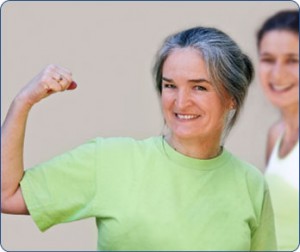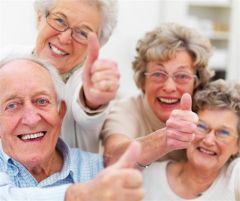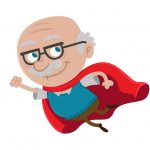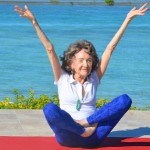Research shows that certain simple behaviors lead to much better heatlh. We don’t need fancy diets or regimens; what we need is to do is: maintain normal weight, exercise at least a few times a week, stop smoking, have breakfast, sleep 7-8 hours, and drink in moderation.
Okay, I said “simple.” But many of us struggle to do even a few of these healthful practices. I wondered if people who have lived most of their lives would have any special advice to help motivate the rest of us. So in our surveys of over 1,200 older Americans, we were interested in what people in their 70s, 80s and beyond would propose the young do about their health.
It turns out that the elders indeed have a profound insight that can transform how younger people look at their health behaviors — before it’s too late. In a nutshell, here’s what they told us:
It’s not dying you should worry about — it’s chronic disease.
This insight — that we should motivate ourselves to healthy behavior based on the threat of chronic illness, and not of dying — can be a powerful motivator for behavior change. Here’s why.
Over the years, I’ve noticed that when people engage in a bad health habit, they try to justify it by talking about dying. Acquaintances who are obese, or smokers, or non-exercisers frequently say that “No one lives forever,” and “Well, if it just cuts a few years of my life, it’s worth it to me.” In fact, I’ve had a couple of beloved family members who said things like: “I love to smoke, so who cares if I drop dead a year or two earlier than I might have?”
According to the oldest Americans, this perspective is all wrong. Because older people know first-hand that the likely penalty for bad health habits isn’t an early death. Instead, dying young is the least of your worries — what you are likely to be in for is years of chronic disease.
Their view is crystal clear: Forget the comforting notion that smoking, over-eating, and other lifestyle choices mean dropping dead one day, a little earlier than other people, perhaps, but so what? In fact, this kind of easy way out almost never occurs. Instead, people sentence themselves to an enormous burden of heart problems, lung disease, and chronic pain, sometimes lasting decades.
So the elders’ lesson is that what you do now for your health is critically important for your future. But, they say, what should really motivate you (I’d even say scare you) is not how long you live, but how well you are going to live. Remember: Your body may need to last you a hundred years — so live that way.
Charlotte, age 84, summed it up nicely:
What you do when you’re young, it will hunt you up when you get old. If you’re young, take care of your body and live right and go to the doctor and keep yourself in good shape. Don’t abuse your body in any way, shape, or form. Now if you don’t do that, a lot of things come out later on in life.
And our interviews show that some of the most regretful elders are those who made bad choices and wound up with debilitating chronic disease. Tina, 80, sadly reported about her beloved husband:
We were married 47 years. He promised me we’d have a 50th anniversary, and he lied to me. He left me at 47 and a half. He was sick for quite a while. He had a heart attack and prior to that he had carotid surgery, first one side then the other. He was a smoker. The kids saw how he had to suffer. And when you told him something about it, ‘Don’t smoke like that’ or his drinking, he’d say ‘So what? You’ve got to die sometime.’ But who suffers? The family.
Examples like this aren’t meant to depress you, but to get you to take action. Stop justifying bad habits by saying “Who cares? We all have to die of something.” Because believe me, there’s no certainty that anyone will just “drop dead” from smoking or obesity — there’s no guarantee of an easy way out after a life of poor health choices. This life lesson from America’s elders is backed up by research — ignore it and you may be looking forward to a long and difficult old age.






